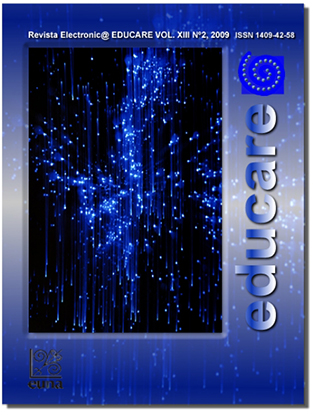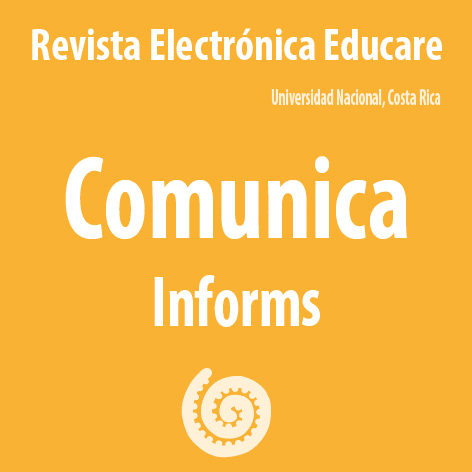Actitud de maestras y maestros hacia el trabajo cooperativo en el aprendizaje de la matemática
DOI:
https://doi.org/10.15359/ree.14-1.10Palavras-chave:
actitud, aprendizaje cooperativo, matemática y actitud hacia el aprendizaje cooperativo de la matemáticaResumo
Recibido 22 de febrero de 2010 • Aceptado 17 de marzo de 2010 • Corregido 22 de marzo de 2010
En este artículo se reportan los resultados más relevantes del proyecto de investigación “Actitud de maestras y maestros hacia el trabajo cooperativo en el aprendizaje de la matemática”, desarrollado en la Escuela de Matemática del Instituto Tecnológico de Costa Rica, bajo el código 5402-1440-2201. Se mide, describe e interpreta la actitud de los maestros y las maestras hacia el trabajo cooperativo en el aprendizaje de la matemática, como resultado de la exposición a un taller en el que se empleó como estrategia metodológica el trabajo cooperativo para el aprendizaje de la matemática. La investigación contempló tanto técnicas cualitativas como cuantitativas.
Referências
Coll, C., Martín, E., Mauri, T., Miras, M., Onrubia, J., Solé, I., et al. (1999). El constructivismo en el
aula. Barcelona, España: Graó.
Costa Rica. Asamblea Legislativa. (1990). Ley 7169. Promoción del Desarrollo Científico y Tecnológico
y Creación del MICYT (Ministerio de Ciencia y Tecnología). Aprobada el 26 de junio
de 1990. San José, Costa Rica: Autor.
Feldman, D. (1999). Ayudar a enseñar. Buenos Aires, Argentina: AIQUE Grupo Editor.
García, C. (2006). La medición en ciencias sociales y en la psicología. En M. González & R. Landeros
(Comp.). Estadística con SPSS y metodología de la investigación. México: Editorial
Trillas.
Gómez, I. (2000). Matemática emocional. Los afectos en el aprendizaje matemático. Madrid, España:
Narcea.
Hernández, R., Fernández, C. & Baptista, P. (2006). Metodología de la investigación. México: McGraw
Hill.
McMillan, J. & Schumacher, S. (2005). Investigación educativa. (5ª ed.). Madrid, España: Pearson
Educación.
Meza, G. (2003). Hacia perfiles de cambio en la enseñanza y el aprendizaje de la matemática: un
caso de estudio en sétimo año de un colegio oficial urbano. En: Revista Virtual de Posgrado
de la UNED. Recuperado el 14 de octubre de 2008, de http://www.uned.ac.cr/sep/recursos/
investigaciones/ded.htm
Molina, Z. (1999, ii semestre). Planificación, diseño y desarrollo curricular. Revista Umbral, 10,
-27.
Robbins, S. (1987). Comportamiento organizacional. México: Prentice Hall.
Rodríguez, G., Gil, J. & García, E. (1996). Metodología de la investigación cualitativa. Málaga,
España: Ediciones ALJIBE.
Taylor, S. & Bogdan, R. (1986). Introducción a los métodos cualitativos de investigación. Buenos
Aires, Argentina: Paidós.
Yus, R. (1997). Desde la cooperación en la escuela a la cooperación para el desarrollo (Una relectura
del pensamiento de Freinet en los albores del siglo XM). Educación, Desarrollo y participación
democrática. Proyecto y tú… ¿Cómo lo ves? Recuperado el 1º de setiembre de 2008, de
http://www.fongdcam.org/manuales/educaciondesarrollo/datos/docs/A_docs/b_1_9_ryus.pdf
Downloads
Publicado
Como Citar
Edição
Seção
Licença
- Caso o artigo seja aceito para publicação, os autores permitem a cessão GRATUITA, EXCLUSIVA E INDEFINITA de seus direitos patrimoniais à Universidade Nacional (UNA, Costa Rica). Para obter mais detalhes, consultar a Carta de originalidade e cessão de direitos.
- Direitos de reutilização: a UNA concede aos AUTORS(AS) o direito de reutilizar para qualquer propósito, incluindo o auto arquivo, e a publicação na Internet ou em qualquer website da versão final aprovada e publicada (post print) do artigo, desde que seja feita para fins não lucrativos, não gere trabalho derivado sem autorização prévia e respeite as fontes de autoria.
- A oferta e possível publicação do artigo na Revista Electrónica Educare reger-se-á pelas suas políticas editoriais, pela regulamentação institucional da Universidade Nacional e pela legislação da República da Costa Rica. Além disso, quaisquer divergências futuras de opinião ou disputa serão resolvidas de acordo com os mecanismos de Resolução Alternativa de conflitos e a Jurisdição da Costa Rica.
- Em todos os casos, entende-se que as opiniões emitidas são de responsabilidade dos autores e não refletem necessariamente a posição e a opinião da Educare, CIDE ou da Universidade Nacional, Costa Rica. Entende-se também que, no exercício da liberdade acadêmica, os autores realizaram um rigoroso processo científico-acadêmico de pesquisa, reflexão e argumentação e que se enquadra na área temática de interesse da Revista.
- Os artigos publicados pela Revista Eletrônica Educare utilizam a Licença Creative Commons:
















 The articles published by Educare Electronic Journal can be shared with a Licença Creative Commons :
The articles published by Educare Electronic Journal can be shared with a Licença Creative Commons : 



